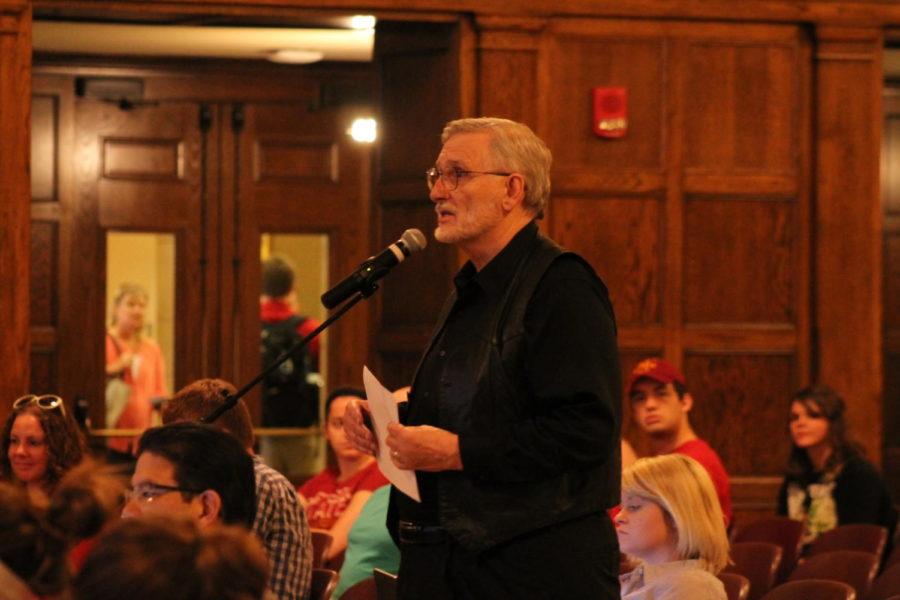Concerns voiced at Veishea open forum
Richard Martinez/Iowa State Daily
Steve Russell, an emeritus faculty member at Iowa State, spoke in front of the Veishea task force during their open forum April 25 in the Memorial Union. Russell, an Ames resident for over 30 years, stressed that Veishea is a tradition worth keeping for the families that attend the event.
April 27, 2014
The Veishea Task Force sponsored an open forum for the student body April 25 to receive feedback on the students’ reactions to Veishea’s suspension and its future.
Tom Hill, senior vice president of student affairs, made it clear the forum’s purpose was to collect the concerns, suggestions and comments of students, and that any specific questions could be submitted and would be responded to at a later time. Nine “Traditional Purposes of Veishea” identified by the 1992 Task Force were presented for the audience to consider.
The discussion opened with Steve Russell, an emeritus associate professor of electrical and computer engineering, saying, “I’m hoping this task force will finally call it like it is. It’s a responsibility for the city of Ames. You are responsible for what happens off-campus.”
Robert Dunn, senior in pre-business, expressed his concerns based on past Veishea incidents and the drinking culture that pervades the celebration.
“Who is Veishea really for?” Adam Guenther, senior in animal science and the organizer of the impromptu Campus Showcase Parade said. “To me I think Veishea really is about the students. Veishea without the sanctioned activities will just become another drink fest.”
Guenther expressed frustration with many faculty administrators and student leaders in not taking an objective viewpoint on Veishea.
“Veishea’s become a week-long drinking celebration. I support the suspension of Veishea this year. I do not support canceling Veishea,” said Kevin Guinan, graduate student in business administration.
Guinan asked that there be a larger representation of students on the task force and encouraged bringing in speakers to denounce irresponsible consumption of alcohol and subsequent behavior.
Similarly, many other students expressed similar concerns that the riot and injury were caused by a fraction of the student body and should not be made to represent the whole, nor should the rioters be the reason for the cancellation of the tradition.
Jerry Pierce, 1995 Iowa Teacher of the Year, decided to address the student body directly.
“Do you know what I see when I see you?” Pierce asked the crowd. “I see the most precious thing on the planet of Earth. I tell you that so you won’t do anything stupid to harm the most precious thing on Earth.”
Pierce encouraged students to act responsibly and to recognize the value of themselves and the value of others, and by extension, respect others’ property. He emphasized that the student body needed to take responsibility and promote self-control throughout the week.
Laura Olson, former journalist and a candidate for county supervisor, said, “I just want to remind everyone that there were only seven police officers that confronted that crowd. The fact that no shots were fired, that no one was killed was a miracle.”
Olson said that though she supports Veishea’s continuation, she suggested the university contribute funding to help the city and county provide more controlled environments in the off-campus areas and deter the celebration’s unfortunate “attractive nuisance.”
She later added that it falls upon individual students to confront their peers in order to address irresponsible or destructive behavior.
“Will we cancel the football season if there’s a disturbance every weekend?” Khayree Fitten, a sophomore in political science and a coordinator for Veishea, asked.
Fitten expressed his displeasure with the cancellation and called out the “hypocrisy” of the university administration for canceling the official Veishea celebration for “student safety,” but not after similar occurrences following other major events throughout the year.
Jonathon Laudner, a junior in management information systems, stressed the need for a controlled environment and the effects on businesses that result from not having the celebration continue.
Ron Tigner, an Iowa State alumnus, agreed with Laudner, explaining how his fraternity would coordinate with other chapters to provide a safe, controlled environment for the Veishea parties with enclosed spaces and student-run security. Tigner said that the incident that occurred this year was not because of Veishea, but because of people focusing on activities outside of the official celebration.
“What is Veishea?” Tigner asked. “Veishea is a celebration of the university.”
There are more open forums being planned through the months of May and June. To contact the task force, you can visit their official website, veisheataskforce.iastate.edu, or email them at [email protected].







